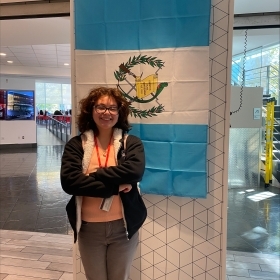St. John's Opens the Institute for Critical Race and Ethnic Studies

The launch of the Institute for Critical Race and Ethnic Studies occurred on October 22nd. The event featured remarks that centered mission, unity, and inclusion. Overall, the events of the day signaled an important moment in the 151-year history of our university as we embraced a true history of our past to guide us into the future.
Tecumseh Ceaser, an artist and cultural consultant from the Matinecock Tribal Nation which was one of the first stewards of the land we now occupy in Queens, opened the event with a land acknowledgement and prayer thanking the creator for “this opportunity to come together.” Mr. Ceaser recounted for us the relationship to the land maintained by the original 13 communities or tribes of Long Island.
The prayer from Rev. Bernard M. Tracey, C.M., M.Div., Executive Vice President for Mission, tied the launch of the CRES Institute to the university’s mission. Rev. Tracey asked for God’s help “in our mission (to) provide our students with an intellectual and moral education embracing the ideal of respect for the rights and dignity of every person.”
Rev. Brian J. Shanley, O.P., the president of our university, noted the importance of critical theories like those important to Critical Race and Ethnic Studies to the goal of freedom and human flourishing.
“The idea of critical theory is to expose both structural and internal forms of coercion that perpetuate illegitimate power structures in a society.”
“I think that is essentially what we want to do in this Institute. … Expose the latent forms of structural and psychological and moral bias that perpetuate a situation in which racism still operates often hidden and unknown,” said Rev. Shanley.
Provost Moller noted the creation of the Institute as a “significant milestone” in the history of the university. He highlighted the central functioning of the Institute, “to be guided by research to seek out solutions to systemic racism.”
Mr. Ginew Benton, the Native American filmmaker who directed, wrote, and acted in the film “Looking Glass,” served as the guest speaker at the launch. Mr. Benton’s remarks reflected on the event. He noted that beginning the Institute by acknowledging the first stewards of the land and creating the opportunity for our students to learn the true history of all the






